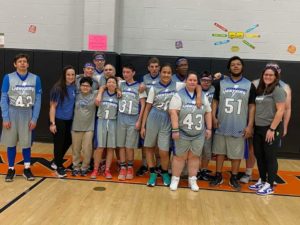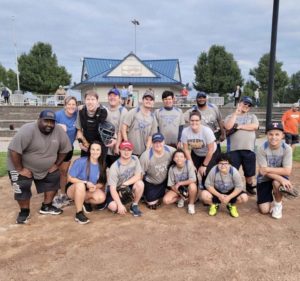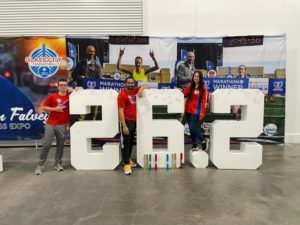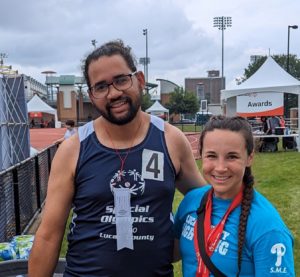Catching Lightning in a Bottle!
Amber Bodette is more than just a Coach!
By Olivia Hovorka
Coaching at any level presents challenges. Amber Bodette, a coach for the Lucas County Lightning, applies her previous experience as a collegiate athlete and a former Special Olympics volunteer in tackling those challenges and creating a positive team culture. She does this all while supporting her athletes beyond their sport. As a young girl, Amber became interested in Special Olympics watching her sister grow up with a disability. She began volunteering for Special Olympics as a junior in high school, which mainly consisted of timing at track meets and keeping score. Amber described her first experience with Special Olympics as “addicting,” and continued her involvement with the organization while in college at Central Michigan University, conveniently located near the Special Olympics Michigan headquarters. While there, she majored in childhood development, was a Unified partner in bowling and basketball, and directed and participated in fundraising events for Special Olympics. After college, Amber settled in Toledo, Ohio where she is employed by Hylant as an insurance broker. In her free time, she continues to volunteer with Special Olympics as the track, basketball, and most recently, coach-pitch softball. Amber is motivated by her love for Special Olympics and its athletes, who she says “hold a special place in my heart.”
Amber’s goal for each athlete is for them to believe in themselves and give their best effort. She has learned about and honed her own communication skills by working with athletes with intellectual disabilities, and understands that athletes respond differently to coaching communication. Some need a gentle hand and a check-in every now and then, while others respond to more direct and explicit coaching. Throughout our interview, Amber emphasized that getting to know and understand each athlete makes all the difference in communicating with them. In doing this, Amber can help them focus on what they bring to the team and find an alternative to an exercise or drill if they become discouraged. Furthermore, she individualizes training based on her athlete’s needs and personalities. Some athletes have dreams of excelling in their sport, while others, Amber said, “would rather stay on the bench, cheer, or just keep score.” To those athletes, just being a part of something is fulfilling. Modification and encouragement are tactics that help Amber in her approach to training. She understands that some athletes may need longer to perform a drill correctly, and she possesses the patience to break things down and explain them thoroughly. To ensure her athletes feel included and valued, she organizes plenty of partner and small group drills and activities. With smaller groups she can correct and focus on an athlete’s technique, which serves to both improve performance and minimize injury risk. While accidents happen and it is nearly impossible to go without injury in any sport, Amber’s training, including in concussion protocol, equip her to recognize and respond to signs of distress. She always gives the ref or ump a heads up about an athlete’s medical issue and stays alert throughout competitions and games herself.
Knowing her athletes goes far beyond understanding them athletically, and Amber believes that supporting an athlete’s personal growth is more important than the 3-4 hours a week they may spend training. She fosters quality communications skills by asking her athletes to speak up, handle conflict, and ask questions. Amber encourages athletes to focus on each other’s accomplishments outside of their sport, like dance and the annual LETR Torch Run. She pushes her athletes to work at the local Kroger and visits them when she knows they’re working. Sometimes, Amber says, it’s more important to “be a kind ear” and listen without solutions or judgment.
Amber possesses the most inspiring qualities of a great coach, and it is no surprise that she was able to start a marathon group with some of her athletes. In 2019, she began training for a marathon in 2020 with athlete Dom Larde, but was unable to compete due to COVID-19. In 2022, they finally completed their first marathon together, and last April, Dom achieved a personal record, knocking off 30 minutes in just his second marathon. The group continues to grow, as will Amber’s rewarding moments as a coach.
Amber coaches by her mantra, “doing your best is more important than being your best,” which furthers the Special Olympics Ohio mission statement: Advancing the inclusion movement through sports, health education, and leadership programs that empower people with intellectual disabilities. She supports the athletes who crave competition and the ones who’d rather watch. Amber says, “you don’t need to be a homerun hitter, we will find where you shine” and that losing does not equal a bad game. The main goal for every athlete is to enjoy doing their best.
Amber has even recruited two of her co-workers at Hylant to become coaches by spreading her positive energy about the athletes and the mission of Special Olympics Ohio. “Just do it,” she says, “become involved and be an advocate.” Simply speaking, coaching for Special Olympics has been a highlight in Amber’s life, and it can be a highlight in yours, too!
If you are interested in coaching at Special Olympics Ohio, go to sooh.org or just click on this link to find out more: Be a Coach.



Author Olivia Hovorka is a MarComs intern for Special Olympics Ohio. She is a student at UC Santa Barbara and a member of the Gauchos Swim Team.
